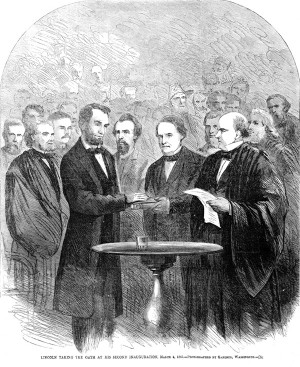On the sunny side of fences, grass begins to make “a feeble display of green,” and along with singing birds signs of spring are “deliciously suggestive.” The Journal noted, “Many of our streets are in horrible condition. The city is either very poor, or its officials very careless of its reputation.” Jacob Voegtle began manufacturing Japanned and stamped tinware at his House Furnishing Emporium on East Washington St opposite the Court House. Long monopolized by Eastern manufacturers, Voegtle will furnish these products at New York rates. A meeting of master mechanics to “consider matters of mutual interest” selected carpenter B. V. Enos, president, and brick mason T. J. Vater, secretary. A committee was appointed to formulate “a plan of action for the master builders.”
Mrs. Emma Waller, as Lady Teazle, performed before a crowded Metropolitan Hall in “that grand old comedy” The School for Scandal. A grand concert was performed at the Fourth Presbyterian Church on its new organ, the largest in Indiana. Several of the city’s organists exhibited “the variety and power of the instrument.” The Fenian Brotherhood celebrated St. Patrick’s Day in the city with a procession followed by a “grand supper, music, songs, and toasts at the Palmer House.”
The mailboat General Lytle from Louisville stopped briefly at Madison, Indiana with Andrew Johnson, Vice President elect, on board. Several hundred persons present on the wharf called for a speech, and Gov. Johnson responded with a short address in which he said he “owed a lasting debt of gratitude” to the Hoosier State for being the first to urge him for vice president. Beneath a clear and beautiful sky, before thousands gathered at the nation’s Capitol, on Saturday, March 4, President Lincoln entered upon his second term; “He has done well.”
Meetings of the drafted men were held every night at the Court House. To avoid having the city depleted of its industrial workers through the draft, Mayor John Caven offered a bounty of $440 (2014: $6,709.49) per volunteer to meet the city’s draft quota, and every drafted man was expected to pay $25 (2014: $381.22) towards the fund. By mid-month the city’s quota was filled and “the present draft has no terrors” for Indianapolis. Three more Indiana regiments – the 148th, 149th, and 153rd – left for the front in the early days of the month. Of the 920 men in the 153rd Regiment, over 400 were veterans. Governor Morton has been authorized by the Secretary of War to raise five more regiments.
Throughout the month the Journal columns listed the Indiana officers and men recently released from Southern prisons. The columns also listed those Indiana soldiers convalescing in hospitals and those who were wounded and died in distant places – Kingston, North Carolina; Nashville, Tennessee; Savannah, Georgia; New Orleans; and Tyler, Texas. The Indiana Sanitary Commission reported receiving $4,139.15 (2014: $63,117.27) in cash donations from Soldiers’ Aid Societies and citizens around the state during the month of February. Purchases sent to Hoosier soldiers included 518 pairs of socks, 180 pairs of drawers, 3,162 pounds of dried apples, 35 crutches, and 100 reams of writing paper and envelopes.
A number of candidate announcements for city offices were published in advance of the Union City Convention which was held the last Saturday of the month. The candidates “were all worthy men,” and those nominated make an excellent ticket. Mayor John Caven was re-nominated without opposition and “well deserves the compliment and reward of a second term.”
At Washington in front of the National Hotel, a large crowd cheered as the 140th Indiana Regiment presented a captured rebel flag to Gov. Morton. President Lincoln was in attendance and spoke briefly about “the recent attempt of our erring brethren…to employ the negro to fight for them.” To hearty cheers and applause, the President said, “They have drawn their last branch of resources and we can now see the bottom. I am glad to see the end so near at hand.” The band struck up “Yankee Doodle.”
Hoosiers read daily the reports of General Sherman’s relentless march through the Carolinas and of General Sheridan’s “relentlessly and ruinously” ride through the Shenandoah Valley. “All the signs of the times combine to show that the present is the final campaign against the great rebellion. The success of our armies and navies, the spirit of our soldiers, the opinions of our officers, the divisions, demoralization and financial difficulties of the enemy, assure us that the triumph of justice, liberty and peace is at hand.”



